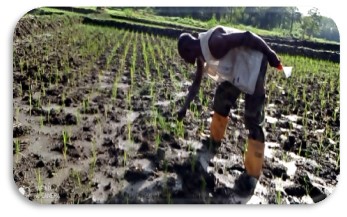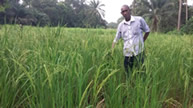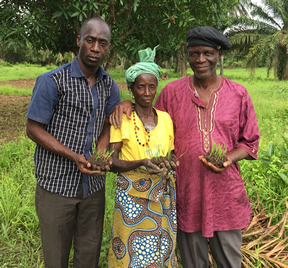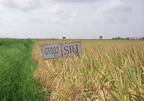GUINEA
Summary of SRI Activities in Guinea
In 2003, Dr. Peng Jimeng, deputy director of the China National Hybrid Rice Research and Development Center introduced hybrid varieties and SRI methods in Guinea. In 2012, a Peace Corps Volunteer and her colleague from the National School of Agriculture and Livestock (ENAE) in Lower Guinea attended a three-day SRI workshop that was held in early September 2012 in Ouémé, Benin. Following the workshop, SRI training was held at the Kanakan's National Agriculture school, which trained 60 students and professors with the intention of incorporating SRI into field trainings.
Also in 2012, Dr. Mamadou Billo Barry, scientific director at the Institut de Recherche Agronomique de Guinée (IRAG), made a presentation and gave an interview on the potential for adoption of the SRI in Guinea at the Regional Workshop on the System of Rice Intensification (SRI), which was held in Ouagadougou, Burkina Faso and organized by the West and Central African Council for Agricultural Research and Development (CORAF/WECARD), the National Center of Specialization for Rice (NCOS-Rice Mali) and SRI-Rice (Cornell University) within the framework of the West Africa Agricultural Productivity Program (WAAPP). Due to growing interest in SR in Guinea following the workshop in Ouagadougou, Burkina Faso, the project Improving and Scaling up the System of Rice Intensification in West Africa, which resulted from the workshop, was formally launched in January 2014. The first phase of the project is running from January 2014 – June 2016. For more information about the SRI-WAAPP project view the project website and the project brochure. The SRI-WAAPP National Facilitator for Guinea is Mamadou Billo Barry, based at L’Institut de Recherche Agronomique de Guinée (IRAG). A 2016 map (right) shows SRI-WAAPP sites in Guinea. In October 2021, the Adaptation Fund approved the “Scaling up Climate Resilient Rice Production in West Africa” (RICOWAS) project which includes Guinea and 12 other countries in the region. During July 2022, Liberia-based Community of Hope Agriculture (CHAP) and Alliance des Eglises et Missions Evangeliques de Guinea (AEMEG) worked together to start a SRI program (FEED la Guinea), beginning with 2 hectares and training 100 farmers in Kalalo.
Progress and Activities
2022 Updates
 "FEED La Guinea" SRI Program Begins in Kalalo
"FEED La Guinea" SRI Program Begins in Kalalo
 [August 2, 2022] The Liberia-based Community of Hope Agriculture (CHAP) has extended operations in neighboring Mano River countries (Sierra Leone and Guinea). Together with Guinean partners, a new CHAP project, entitled "FEED La Guinea," has kicked off with SRI trial plots on two hectares in Kalako, Guinea, with over 100 smallholder farmers coming together to learn SRI methods. The effort in Guinea was initiated after the visit of Bishop Dr. Joseph Dore, President of Alliance des Eglises et Missions Evangeliques de Guinea (AEMEG) to Liberia SRI fields in December 2021. Robert S.M. Bimba, Director of CHAP, accepted the invitation and started operation in June; the first rice was transplanted July 15, 2022. CHAP sent one of its SRI experts, Jacob Fayiah Kengefi, to help layout the field, train farmers in SRI nursery management, and explain the SRI principles.
[August 2, 2022] The Liberia-based Community of Hope Agriculture (CHAP) has extended operations in neighboring Mano River countries (Sierra Leone and Guinea). Together with Guinean partners, a new CHAP project, entitled "FEED La Guinea," has kicked off with SRI trial plots on two hectares in Kalako, Guinea, with over 100 smallholder farmers coming together to learn SRI methods. The effort in Guinea was initiated after the visit of Bishop Dr. Joseph Dore, President of Alliance des Eglises et Missions Evangeliques de Guinea (AEMEG) to Liberia SRI fields in December 2021. Robert S.M. Bimba, Director of CHAP, accepted the invitation and started operation in June; the first rice was transplanted July 15, 2022. CHAP sent one of its SRI experts, Jacob Fayiah Kengefi, to help layout the field, train farmers in SRI nursery management, and explain the SRI principles. Since the work began in Kalalo, Guinea, there has been good momentum among smallholder farmers to learn more about SRI. The vision of feeding Guinea with home-grown rice is resonating with key stakeholders, including the Chairman of the National Transition Assembly, Religious Affairs and other actors. Most of the farming groups are women-dominated and eager to learn more about SRI for the first time. To ensure that what farmers produce is bought in a timely manner, CHAP is working on launching the “I love Guinea Rice” and “Feed la Guinea” campaigns to get a buy-in from consumers for local home-grown rice. [See article by Robert Bimba]
2021
 Guinea Included in Four-Year Regional SRI-Based RICOWAS Project
Guinea Included in Four-Year Regional SRI-Based RICOWAS Project
[October 21, 2021] The Adaptation Fund (AF) has approved the “Scaling up Climate Resilient Rice Production in West Africa” (RICOWAS) project in October 2021. The four-year, $14 million effort, which emphasizes the System of Rice Intensification (SRI), is the largest regional project funded by the AF in Africa, covering thirteen ECOWAS countries. In Guinea, the Agronomic Research Institute (ARI) will be in charge of executing the project. The overall purpose of the initiative is to improve climate resilience and increase the productivity of the rice system of smallholder rice farmers in West Africa. Regionally, the Sahara and Sahel Observatory (OSS), will oversee the project overall implementation. The Rice Regional Center of Specialization, hosted by the Institute of Rural Economy (IRE) of Mali, will be in charge of the regional level execution and will work in partnership with the Climate Resilient Farming Systems program at Cornell University. [See OSS article for more information.]
 Smallholder Paddy Productivity and Market Linkages in Kindia Prefecture, Guinea
Smallholder Paddy Productivity and Market Linkages in Kindia Prefecture, Guinea
[June 21, 2021] An understanding of how the System of Rice Intensification method, which has been promoted by the West Africa Agricultural Productivity Programme (WAAPP), has influenced sustainable solutions to smallholder paddy farmers’ challenges of poor yield and marketing in Kindia Prefecture, Guinea, informed a study published in the journal Afrika Focus. The authors carried out a survey of 126 beneficiaries and 78 non-beneficiaries of the WAAPP. Data were collected primarily on the farmers’ enterprise characteristics: improvement in productivity, sales, and income from paddy. WAAPP- and non-WAAPP-participating farmers had >10 years of farming experience. The findings showed that WAAPP farmers (67.5%) achieved higher sales and income from paddy than in the past. The productivity of the WAAPP farmers was higher and significantly different from that of the non-WAAPP farmers. The authors contend that farmers’ opinion of market prospects after WAAPP intervention and their age significantly influenced their change in productivity. The WAAPP program resulted in increased paddy production. [See article in Africa Fokus. For full text access, join the SRI Research Network or contact the authors.]
2020
 The NGO Trias Helps Farmers Reduce Environmental Damage and Raise Yields with SRI
The NGO Trias Helps Farmers Reduce Environmental Damage and Raise Yields with SRI
[February 28, 2020] In order to help family farmers adapt to the effects of climate change, the NGO Trias promotes, together with its partners, agro-ecological approaches that can help reduce the impact of chemicals on the environment and operating costs for farmers, while guaranteeing the health of consumers by bringing quality products to market. During 2019, a series of training sessions were carried out for producers on the System of Rice Intensification (SRI), compost, crop rotation, etc. These have significantly helped to increase rice yields and to reduce the quantities of seeds used on the acreage. The trainings were backed up by regular advisory support visits to ensure the correct use of the practices. Peer-to-peer learning was also put to use through exchange visits between producers on agro-ecological practices as well as an open day on SRI. The yield of rice per hectare increased from 2 tons to 6 tons in certain localities and from 2.5 tons to 5 tons in other localities thanks to a correct application of the SRI. The quantities of rice seeds are reduced from 100 kg per hectare to 30 kg, i.e. a reduction of 70%. [See page 19 in the Trias 2019 annual report (in French]
2017
 Peace Corps SRI Training in Yorokogueyah
Peace Corps SRI Training in Yorokogueyah
[January 30, 2017] Peace Corps Guinea's thirteen Agroforestry Extension trainees arrived in Guinea in December 2016, and participated in two training sessions on the System of Rice Intensification in January 2017. At the training site in Yorokogueyah (Dubreka), Hillary Mara, Guinea RPCV ‘14 and SRI-Rice team member, led an introductory session on the basic principles of SRI as well as background on the importance of rice cultivation in Guinea. Trainees engaged on technical, biological, and socio-economic aspects of SRI. Trainees then practiced improved seed sorting methods. A nursery was prepared and about 12 days later, trainees had the hands-on experience of transplanting young seedlings following SRI management techniques. Trainees experimented with using both rakes and ropes as markers. The trainees leave for their respective communities in early February and will soon begin to identify possible partners and sites for testing SRI with community members in the coming rainy season.
2016
 Farmers Impressed by Peace Corps SRI Plots Near Dubreka
Farmers Impressed by Peace Corps SRI Plots Near Dubreka
 [November 30, 2016 ] Rainfed lowland rice planted by Peace Corps volunteers during an SRI training in Dubreka, Guinea in early August have reached maturity, demonstrating impressive growth and tillering (photo at right). Peace Corps Agroforestry Program Manager, Kalifala Fofana, notes: “The farmer near the field is appreciating it at every occasion. If I look at each rice plant coming only from a single seedling, it is amazing!” Hillary Mara, SRI team member, will be leading another SRI training for Peace Corps volunteers in Guinea this December.
[November 30, 2016 ] Rainfed lowland rice planted by Peace Corps volunteers during an SRI training in Dubreka, Guinea in early August have reached maturity, demonstrating impressive growth and tillering (photo at right). Peace Corps Agroforestry Program Manager, Kalifala Fofana, notes: “The farmer near the field is appreciating it at every occasion. If I look at each rice plant coming only from a single seedling, it is amazing!” Hillary Mara, SRI team member, will be leading another SRI training for Peace Corps volunteers in Guinea this December. SRI Training for Extension Agents, Farmers, Community Leaders, and Peace Corps Volunteers
SRI Training for Extension Agents, Farmers, Community Leaders, and Peace Corps Volunteers
[August 24, 2016] Hillary Mara, graduate student in the Cornell Institute of Public Affairs, spent 6 weeks in Guinea during mid-2016 training field agents and staff at the NGO NARSEME (Nature ressources pour les services écosystémique et les moyens
 d'existence), farmers, rural community leaders, and Agroforestry Peace Corps volunteers in the SRI methodology.
d'existence), farmers, rural community leaders, and Agroforestry Peace Corps volunteers in the SRI methodology. In the small rural community of Madina Oula, Kindia region, Martin Kourouma, Head of Project Development with NARSEME, and Mara shared the SRI information with NARSEME field agents, key farmers and resource people in the community. Following sessions on SRI theory and seed sorting, they worked with farmers to build demonstration and comparison plots, and a nursery for SRI seedlings. This work, which was replicated in the nearby town of Badet Kanty, was followed later with transplanting and weeding sessions, including the use of a rope-marker for plant spacing and a upland rice weeder, appreciated for its remarkable efficiency. Mara remarked, "Farmers were especially intrigued by the 95% reduction of seed: as the only purchased input for small holder rice farming, this represents a significant reduction in expenses for farmers and is very appealing to subsistence farmers." During August, Mara also traveled to the Peace Corps training site in Dubreka and led a training for over 20 Agroforestry volunteers. (See article and photo album.)
 SRI-WAAPP Sites Expanded
SRI-WAAPP Sites Expanded
[May 2016] SRI continues to expand the areas of Guinea where rice is cultivated, as can be seen in the SRI-WAAPP project site map. The map, which is current as of 2016, shows 20 sites where farmers have received training in SRI since the SRI-WAAPP formally began in 2014. For more information, visit the SRI-WAAPP Guinea web page.
2013-2014
 Regional Project to Scale Up SRI Formally Launched
Regional Project to Scale Up SRI Formally Launched
[January 1, 2014] As one of 13 participating countries in the World Bank-financed regional project "Improving and Scaling up the System of Rice Intensification in West Africa" (SRI-WAAPP) that formally began in January 2014, Guinea participates in the project in regional workshops, trainings and meetings is undertaking nationally funded SRI activities through the WAAPP. Part of the larger and on-going West Africa Agricultural Productivity Program (WAAPP), SRI-WAAPP grew out of demands for technical and training assistance in SRI from most of the 13 countries, which resulted in a commissioned project development with an initial regional workshop to design the project in Ouagadougou, Burkina Faso in July 2012. The first phase of the project is running from January 2014 – June 2016. For more information about the SRI-WAAPP project view the project website and the project brochure. The project's Regional Coordination Unit is a partnership between Mali's National Center of Specialization in Rice (CNS-Riz) who houses the regional coordinator and SRI-Rice as the technical and strategic partner for this project, The SRI-WAAPP National Facilitator for Guinea is Mamadou Billo Barry, based at L’Institut de Recherche Agronomique de Guinée (IRAG). For more about SRI activities in Guinea through the SRI-WAAPP project, visit the project's Guinea page. Since the project's initial planning workshop in 2012, Guinea has participated in the numerous regional workshop (see reports for the various national and regional SRI-WAAPP activities).
2012
 SRI Trainings and Trials Undertaken Following West Africa SRI Training in Benin
SRI Trainings and Trials Undertaken Following West Africa SRI Training in Benin
A Guinea Peace Corps Volunteer and her colleague from the National School of Agriculture and Livestock (ENAE) in Lower Guinea attended a three-day SRI workshop that was held in early September 2012 in Ouémé, Benin. The event was a collaboration between the West Africa Food Security Partnership, SRI-Rice at Cornell University, and the Conseil de Concertation des Riziculteurs du Benin (CCR-B), and was hosted at the Solidarité Agricole Integrée (SAIN) teaching farmer and research center in Kakanitchoé, Ouémé.
Following the training, the Guinea participants to the workshop from ENAE conducted SRI trainings at the Kankan’s National Agriculture School. Over 60 agricultural students and professors attended. ENAE plans to integrate SRI into its trainings, conduct SRI trials and install demonstration fields. During their internships, students at ENAE will then be able to transfer their knowledge and skills on SRI to the NGOs, development projects, agriculture centers and other organizations that host their internships.
 Scientific director at the Institut de Recherche Agronomique de Guinée (IRAG) Attends SRI Workshop in Burkina Faso
Scientific director at the Institut de Recherche Agronomique de Guinée (IRAG) Attends SRI Workshop in Burkina Faso
Dr. Mamadou Billo Barry, scientific director at the Institut de Recherche Agronomique de Guinée (IRAG), made a presentation and gave an interview (at right) on the potential for adoption of the SRI in Guinea at the Regional Workshop on the System of Rice Intensification (SRI), which was held in Ouagadougou, Burkina Faso. The workshop, which was held July 26 and 27, 2012, was organized by the West and Central African Council for Agricultural Research and Development (CORAF/WECARD), the National Center of Specialization for Rice (NCOS-Rice Mali) and SRI-Rice (Cornell University) within the framework of the West Africa Agricultural Productivity Program (WAAPP). Based on information Dr. Barry learned at the workshop, he plans to set up trials in several plots in lowland periurban areas and also to engage with other governmental and non-governmental groups in Guinea.
2003 Activity
 SRI Introduced into Guinea along with Hybrid Varieties from China
In 2003, Dr. Peng Jiming, deputy
director of the China National Hybrid Rice Research and Development Center, while
introducing hybrid varieties in this country also introduced SRI methods. The
combination produced yields as high as 9 t/ha in
a country where the current average yield is below 2 t/ha. The China National
Hybrid Rice Center is introducing SRI methods in many areas that it is promoting
its hybrid rice in Africa.
SRI Introduced into Guinea along with Hybrid Varieties from China
In 2003, Dr. Peng Jiming, deputy
director of the China National Hybrid Rice Research and Development Center, while
introducing hybrid varieties in this country also introduced SRI methods. The
combination produced yields as high as 9 t/ha in
a country where the current average yield is below 2 t/ha. The China National
Hybrid Rice Center is introducing SRI methods in many areas that it is promoting
its hybrid rice in Africa.
Reports and Articles
- Bimba, Robert S.M. 2022. CHAP embarks on System of Rice Intensification (SRI) program in Guinea. July 27. SRI-Rice website, Guinea page. July 27. (2p pdf) [Description of the Liberia-based NGO CHAP's new SRI collaboration in Guinea.]
- Kourouma, Fella. 2020. Rapport Annuel d’activités: Année 2019. TRIAS website. [See p.19 for information on Trias' SRI project]
- Fadairo, Olushola Samuel, and Moussa Sanguiana Keita. 2021. The West Africa Agricultural Productivity Programme (WAAPP): Smallholder paddy productivity and market linkages in Kindia Prefecture, Guinea. Afrika Focus 34(1): 127-154. doi:10.1163/2031356X-34010003
- Diallo, Mamadou Alimou. 2018. Comment produire le riz de manière intensive: Système de Riziculture Intensive (SRI). Agrofast Guinee website. December 1. [French langauge article from Guinea that describer the steps to planting SRI.]
- Mara, Hillary. 2016. SRI in Guinea: Training extension agents, farmers, community leaders, and Peace Corps Volunteers. August 24 feature article, SRI-Rice website. [Article on Hillary Mara's 2016 SRI trainings with NGOs and the Peace Corps in Guinea, West Africa.]
- 2014. Le Système de Riziculture Intensive (SRI) en Guinée: Des rendements du riz jusqu’à plus de10 tonnes par ha confirm és par la recherche! L’Institut de Recherche Agronomique de Guinée (IRAG). SRI West Africa website.
- 2014. Note sur l’introduction et l’adaptation du Système de Riziculture Intensive (SRI) en Guinée. L’Institut de Recherche Agronomique de Guinée (IRAG). Octobre 2014.
- Jiming, Peng. Studies on the Use of Chinese Hybrid Rice with Modified SRI in Guinea. China National Hybrid Rice Research and Development Centre, Hunan, China. System of Rice Intensification website. (3p., 377KB pdf)
Videos and Presentations
- Mara, Hillary. 2017. Rice Production in Guinea and SRI; Peace Corps Guinea Agroforestry PST. 54 slides. Presented at SRI Peace Corps Guinea Agroforestry PST, Dubreka, Guinea, January 9, 2017. SRI-Rice channel, Slideshare.net. [uploaded January 26, 2017]
- 2016 (October 12). SRI Line Spacing, Madina Oula, Guinea. 1:03 min. SRI-Rice channel, YouTube. [Description of SRI field preparations by the NGO Narseme in Guinea.]
- 2015: (April 6). Video SRI Guinée. 18.26 min. SRI-Rice channel, YouTube. [French language TV clip with farmer SRI interviews.]
- 2012 (August 23). First West Africa SRI Workshop, Ouagadougou, 8/26-27/12: Mamadou Billo Barry (Guinea) (French). 2:24 min. Produced by SRI-Rice. SRI Rice channel, YouTube. [Comments (in French) by Dr. Mamadou Billo Barry, scientific director at the Institut de Recherche Agronomique de Guinée (IRAG), Conakry, while attending the First West Africa System of Rice Intensification (SRI) Workshop, Ouagadougou, Burkina Faso, July 26-27, 2012.]
- Potentialites pour le SRI en Guinée
Powerpoint presented at the West Africa Regional SRI Workshop, Ouagadougou, Burkina Faso, July 26-27, 2012. 6 slides.
Photos
- The SRI-Rice Guinea Photo Collection contains photographs of SRI fields taken in Guinea



